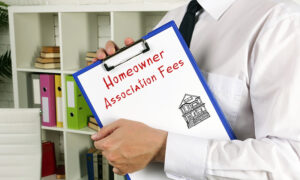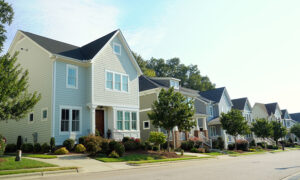Both homeowners and board members should familiarize themselves with the HOA foreclosure laws in North Carolina. In doing so, they can understand the rights of homeowners and the scope of authority an HOA has when it comes to foreclosures. It also helps keep the association in the clear and away from potential liability.
Understanding HOA Foreclosure Laws In North Carolina
 Homeowners living in HOA communities must pay dues to their association. If a homeowner falls behind on these dues, they may face consequences, including a lien followed by foreclosure.
Homeowners living in HOA communities must pay dues to their association. If a homeowner falls behind on these dues, they may face consequences, including a lien followed by foreclosure.
According to NC HOA foreclosure laws, a homeowners association or condo association can place a lien on a home when the owner becomes delinquent in paying their HOA fees. The association can also charge the owner for unpaid dues, late charges, fines, interest, and attorneys’ fees, among other charges.
However, North Carolina HOA foreclosure laws also stipulate specific requirements. For instance, an HOA or COA must provide the owner notice before filing a lien. The association must also give the owner a copy of the lien itself.
It doesn’t stop there. An HOA or COA may also foreclose on a lien. This foreclosure typically follows the nonjudicial route, which requires a preforeclosure notice. If the lien arises from a debt consisting solely of fines, the association must go through a judicial foreclosure.
North Carolina Foreclosure Process
In North Carolina, associations have a relatively easy time foreclosing on liens against homeowners. However, there are some things HOA boards must keep in mind.
Rules on Preforeclosure
According to N.C. Gen. Stat. Section 47F-3-116(f) and Section 47C-3-116(f), an owner’s dues must remain unpaid for at least 90 days before an HOA can begin foreclosure. Additionally, the HOA board must vote to start the foreclosure process; otherwise, the association can’t foreclose on the lien.
Notice of Preforeclosure
For nonjudicial foreclosures, HOAs and COAs must provide notice to the homeowner. This notice should indicate the association’s intention to begin foreclosure proceedings.
Foreclosure Based Solely on Fines
According to N.C. Gen. Stat. Section 47F-3-116(h) and Section 47C-3-116(h), an HOA can’t use nonjudicial foreclosure if an owner’s lien consists solely of fines. This includes any unpaid interest or attorneys’ fees related to the penalties. An HOA or COA must take the judicial foreclosure route for such liens.
Right of Redemption
In a nonjudicial foreclosure, the borrower can redeem the property before the upset bid period expires. In North Carolina, the upset-bid period spans ten (10) days after filing the sale report.
Following the foreclosure sale, a separate buyer can purchase the property by placing a higher bid than the one made during the sale. This is otherwise known as an “upset bid.”
The submission of an upset bid initiates a new 10-day upset bid period. Within this period, the borrower retains the right to pay off the debt and redeem the property fully.
A person must satisfy the debt and cover all expenses related to filing and enforcing the lien so they can redeem the property. These expenses include but are not limited to advertising costs, attorneys’ fees, and foreclosure sale costs.
HOA Foreclosure Laws in North Carolina: Liens
An HOA or COA in North Carolina can attach a lien to an owner’s property once unpaid assessments become 30 days late. The association can make this lien effective by filing a claim of lien with the clerk of the superior court in the county where the property sits.
Unless the association’s governing documents say otherwise, an HOA or COA in NC can include the following charges in its lien:
- Overdue fees and assessments
- Late charges not exceeding $20 per month or 10% of any unpaid assessment, whichever is greater (N.C. Gen. Stat. Section 47F-3-102(11) and Section 47C-3-102 (11))
- Fines for CC&R violations
- Interest on overdue fees and assessments not exceeding 18% per year (N.C. Gen. Stat. Section 47F-3-115(b) and Section 47C-3-115(b))
- Other charges (such as costs related to preparing and recording documents)
Lien Notice Requirement
An HOA or COA must deliver a statement of the assessment or fee amount due to the homeowner. The association must deliver this statement through first-class mail no fewer than 15 days before the lien filing.
Before the HOA or COA officially files the claim of lien, it must deliver a copy of the claim to the homeowner. This can be done through personal service or via first-class mail.
Notice for Attorneys’ Fees and Costs
An HOA or COA can seek reimbursement for reasonable attorneys’ fees and costs associated with collecting any outstanding sums. However, before pursuing payment of attorneys’ fees, costs, and expenses, the association must formally notify the homeowner in writing of its intention to do so.
- Notice Contents. The notice should specify the outstanding balance as of the notice date and grant the owner a 15-day period from the mailing date to settle the due balance without incurring attorneys’ fees and court costs.
- Payment Plans. The notice should allow the owner to talk to a representative from the HOA or COA to explore a payment plan for the outstanding balance. The notice must include the name and telephone number of the representative for easy contact.
Is North Carolina a Super Lien State?
 North Carolina is not a super lien state. The law in NC dictates that an HOA or COA lien holds priority over all other liens and encumbrances except for the following:
North Carolina is not a super lien state. The law in NC dictates that an HOA or COA lien holds priority over all other liens and encumbrances except for the following:
- Liens and encumbrances recorded prior to the filing of the claim of lien (including a mortgage or deed of trust); and,
- Liens for real estate taxes and other government charges.
The law does not impact the priority of mechanic’s liens or materialman’s liens.
With this, if an HOA or COA forecloses on a property, the association’s lien does not take priority over a first mortgage.
Frequently Asked Questions on HOA Foreclosure Laws in North Carolina
How long does a lien stay on your property in North Carolina?
In North Carolina, a judgment lien remains attached to the debtor’s property for 10 years. The lien remains there until satisfied, even if the property is sold to another person.
A lien for unpaid dues and assessments, though, is eliminated unless an HOA or COA begins enforcement proceedings within three (3) years following the filing of the lien.
Can a homeowners association foreclose on your home in North Carolina?
Yes, a homeowners association or condo association can foreclose on your home in North Carolina. NC foreclosures are a pretty common enforcement procedure for unpaid dues and assessments. An HOA can even foreclose on a home for outstanding debts consisting solely of fines, though it must do so using the judicial foreclosure process.
Can an HOA evict a homeowner in NC?
While an HOA or COA can foreclose on a home in NC, it cannot evict a homeowner like a landlord evicts a tenant. If a homeowner refuses to leave the property even after foreclosure, an HOA or COA should seek help from a lawyer.
That said, if an HOA or COA directly leases or rents out a property to a tenant, they can evict that tenant by following proper eviction procedures and requirements.
Help With HOA Foreclosure Laws in North Carolina
An HOA’s ability to foreclose on a home is important because it provides real stakes and consequences. It encourages owners to remain up-to-date on their dues and other payments to the association. However, it is easy for HOA boards to get lost in all these laws, especially for inexperienced boards. As such, associations would benefit from hiring an HOA management company.
Cedar Management Group provides legal assistance to associations, including help with navigating HOA foreclosure laws in North Carolina. Call us today at (877) 252-3327 or contact us online to learn more!
RELATED ARTICLES:
- Virginia HOA Foreclosures: What VA HOA Homeowners Should Know
- Tennessee HOA Foreclosure: What Can Happen To A Homeowner’s Property?
- HOA Foreclosures In South Carolina: Beware Homeowners Who Fail to Pay Their HOA Dues






